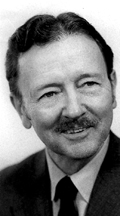Brigadier General William Whipple Jr., 98, of Princeton, New Jersey, died August 23 in Princeton. A retired Army officer, Rhodes scholar, and public servant, he had been a longtime resident of the Princeton area.
Born in 1909, he grew up on a sugar plantation in Cinclare, Louisiana. His father, William Whipple, an MIT engineer brought up in the New York area, had come south to become the factory superintendent of the sugar refinery on the plantation. The second of five children, William Jr. graduated from West Point in 1930, went on to study economics and philosophy at Oxford as a Rhodes Scholar, and several years later did a year of graduate studies in engineering at Princeton University.
A fellow of the American Society of Civil Engineers, he was the chief engineer for the construction of the 1964-65 World’s Fair in New York.
During World War II he had served as a member of General Dwight D. Eisenhower’s Allied Headquarters, where his logistical planning helped to shape the course of battle in western Europe. After the war, while assigned to General Lucius Clay’s headquarters in Berlin, he advocated the idea that U.S. policy toward the devastated German nation should be restorative rather than punitive. General Clay and others agreed, and the Morgenthau Plan to make Germany an agrarian nation was scrapped in favor of what became known as the Marshall Plan. General Whipple referred to his role in this development as “probably the most important thing I ever did.”
Many of General Whipple’s peacetime assignments were in civil works, a traditional area of activity for the Army Corps of Engineers. Before World War II, he served for several years in the Omaha District, with responsibilities for navigation and flood control projects in the Missouri River Basin. After returning to the U.S. in 1947 with the rank of colonel, he was sent to the Pacific Northwest where he led the planning for water resources development of the Columbia River Basin, and coordinated and edited the report of the project. He later held a civil works assignment in the Office of the Chief of Engineers in Washington, D.C., serving as division engineer for the Southwestern Division.
Retiring from the Army in 1960 after 30 years of service, he became the chief engineer for the construction of the 1964-65 World’s Fair, under Robert Moses. He subsequently served as director of the New Jersey Water Resources Research Institute at Rutgers University, and participated in a number of professional associations, including serving as president of the American Water Resources Association. In 1982, he joined the New Jersey Department of Environmental Protection, where he played a key role in implementing a statewide water supply master plan and other key projects. His final employment was with the Greeley-Polhemus Group, an engineering consulting firm, in West Chester, Pennsylvania.
A recognized authority on water resources, he wrote more than 100 books and articles on water supply, navigation, flood control, and power generation.
After retiring again in 1996, he continued to write and to participate in conferences relating to water resources. His final book, Comprehensive Water Planning Regulation, proposed a holistic approach to water resources planning aimed at achieving general benefits from water resources projects while accommodating environmental concerns.
He was a member of Trinity Episcopal Church of Princeton, and of the Old Guard of Princeton.
He is survived by his wife of 23 years, Dr. Alice Goodloe Whipple; four children, Anne Andersen, William Whipple III, Claire Stech, and Philip Whipple; eight grandchildren; and five great-grandchildren.
He will be buried with full military honors in the Arlington National Cemetery on 13 November 2007.
WHIPPLE, WILLIAM
- BG US ARMY
- WORLD WAR II
- DATE OF BIRTH: 02/04/1909
- DATE OF DEATH: 08/23/2007
- BURIED AT: SECTION 8 SITE 5406-D
- ARLINGTON NATIONAL CEMETERY
Michael Robert Patterson was born in Arlington and is the son of a former officer of the US Army. So it was no wonder that sooner or later his interests drew him to American history and especially to American military history. Many of his articles can be found on renowned portals like the New York Times, Washingtonpost or Wikipedia.
Reviewed by: Michael Howard

